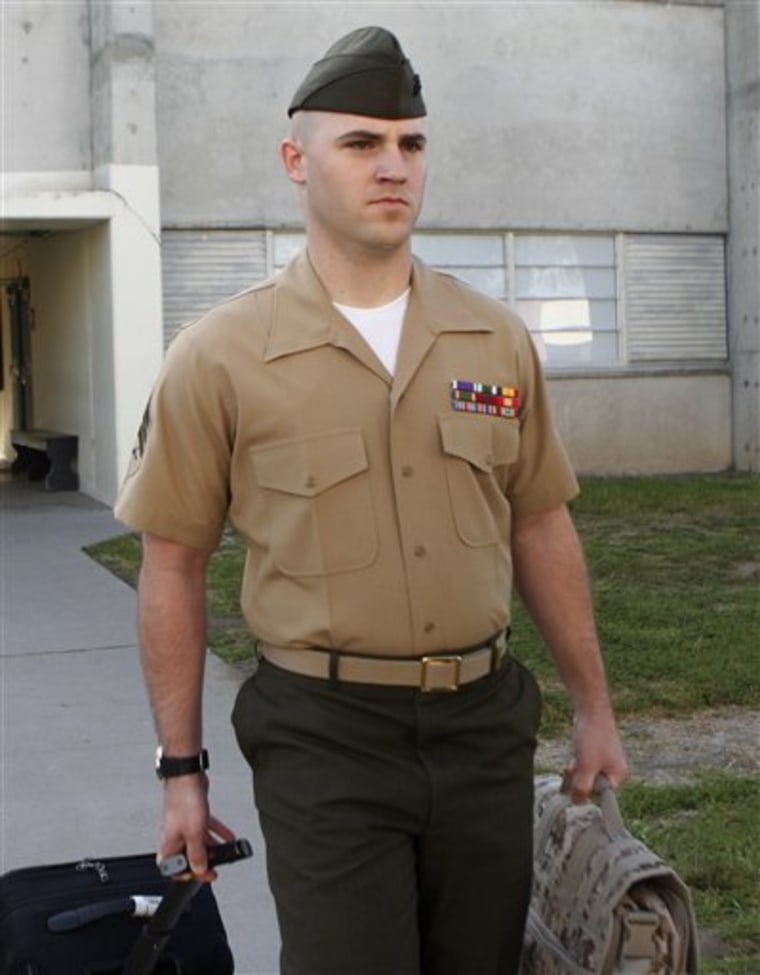A military jury on Thursday acquitted a Marine sergeant on charges of murdering an unarmed detainee during battle in Fallujah, Iraq.
The jury of eight Marines who served in Iraq or Afghanistan also acquitted Sgt. Ryan Weemer on Thursday of dereliction of duty in the November 2004 death.
Weemer could have faced a maximum sentence of life in prison and dishonorable discharge if convicted of murder. The maximum sentence for dereliction is six months in prison and a bad conduct discharge.
The defense argued during closing arguments that the 26-year-old Weemer acted in self-defense.
Weemer belonged to a squad involved in vicious house-to-house fighting in Fallujah during "Operation Phantom Fury."
Weemer's attorney told the jury that prosecutors could not prove their case because they have no body, no forensic evidence and no relatives complaining of a lost loved one.
Prosecutors, however, played recorded interviews in which Weemer said he and other Marines shot a total of four men in Fallujah in November 2004 after their squad suffered its first fatality.
His former squad leader was earlier acquitted of related charges in federal court and another squad member has yet to face court-martial.
Odd origin to case
The case came to light long after the battle.
In 2006, after he left the Marine Corps, Weemer applied for a job in the Secret Service. During a background interview before a polygraph test as part of the application, he was asked about the most serious crime he ever committed.
"We went into this house, there happened to be four or five guys in the house," Weemer said in a recording of the interview played during the prosecution's opening statement. "We ended up shooting them, we had to."
The U.S. military had ordered all civilians out of Fallujah ahead of an assault aimed at recapturing the city from insurgents.
Weemer's account triggered a criminal investigation and led to Weemer being recalled to active duty to face military prosecution.
"This is a case about following the rules, this is a case about doing the right thing at the most critical time," the prosecutor, Capt. Nicholas Gannon, told the jury of eight officers.
Weemer's civilian attorney, Paul Hackett, countered that it was "a tragic story that represents the reality of combat."
"This is not a perfect science. ... Marines are put in tough positions and they have to make snap decisions," Hackett said.
Ordered to clear house
Weemer's squad, led by Sgt. Jose Nazario, had been ordered to clear a house immediately after losing its first man, Lance Cpl. Juan Segura, who was shot by a sniper.
Inside the home, the Marines found three young men and one older man, who were unarmed and had their hands in the air, prosecutors said. Hackett said a sweep of the property turned up at least two AK-47s with hot barrels as well as spent ammunition cartridges.
Weemer said in the interview that the unarmed Iraqis were slain after the squad asked superiors for instructions.
"We called up to the platoon leader and the response was, 'Are they dead yet?'" Weemer said in the recording.
Hackett said military investigators returned to the house and carried out extensive forensic analysis but found no bullet fragments or blood spatters.
The defense attorney also said Weemer never took the actual polygraph test during the Secret Service interview.
The squad was from Kilo Company of the 3rd Battalion, 1st Marine Regiment, the same company that a year later was involved in the widely publicized killings of 24 men, women and children in Haditha. None of the Marines from the Fallujah case were involved in the Haditha case.
In his Secret Service interview, Weemer said news of the Haditha investigation had gotten him thinking about things he did during the war.
The prosecution also played a recording of a subsequent interview of Weemer by Navy investigators.
Weemer described an argument that broke out among squad members over what to do with the detainees. He said that after Nazario shot two men, the squad leader asked his colleagues to help him dispose of the other two.
"I just remember that we didn't want to do that," Weemer said. "Finally, I grabbed a guy and took him ... and I shot him ... with my pistol."
Nazario was beyond the reach of a Marine recall after the investigation because he had completed his military obligations. He was tried in U.S. District Court and found not guilty of voluntary manslaughter, assault with a deadly weapon and discharging a firearm during a crime of violence.
Another sergeant, Jermaine Nelson, has pleaded not guilty to unpremeditated murder and dereliction of duty, but his court-martial has been indefinitely postponed because of a flurry of last-minute motions filed by his attorney.
